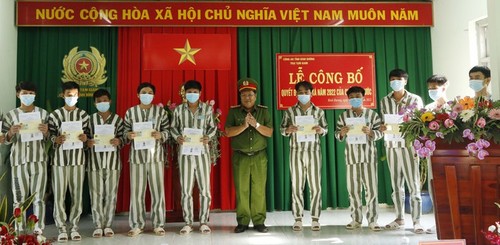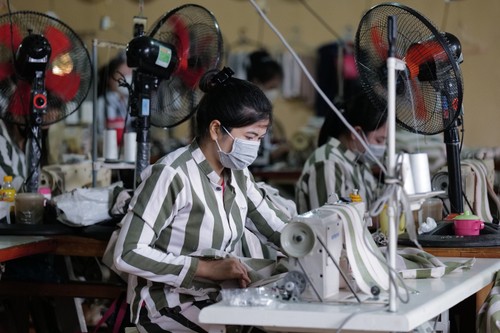 11 prisoners in Binh Duong Police's detention establishment are granted amnesty in 2022 (Photo: chinhphu.vn) 11 prisoners in Binh Duong Police's detention establishment are granted amnesty in 2022 (Photo: chinhphu.vn) |
The President’s amnesty decision reflects Vietnam’s priority of ensuring and promoting human rights in all undertakings and policies of the Party and State and refutes all slanders and distortion by hostile and reactionary forces who claim that Vietnam does not guarantee human rights.
In Vietnam, human rights are understood as the basic values that people have won in their struggles to tame nature and society in order to affirm their political, economic, social, cultural and legal status. It is the totality of human needs, capacities, freedoms and dignity of individuals and the community that are recognized and guaranteed in the national and international legal systems. Protecting and promoting human rights is the consistent policy of the State of Vietnam.
Vietnam always considers people as the center, the driving force of the renovation process and the development of the country, and always strives to improve people's lives and their enjoyment of rights and leave no one behind. In Vietnam, basic human rights are enshrined in the Constitution and protected and promoted in specific legal documents and implemented in practice.
The Resolution of the 13th National Party Congress affirmed the need to respect, ensure and protect human rights, and citizen rights and obligations according to the 2013 Constitution and associate citizen rights with civic obligations and responsibilities”.
The Resolution emphasized that the people are the center and the subject of national renewal, construction and defense. All guidelines and policies must really come from the people's life, aspirations, rights, and legitimate interests, and take the people's happiness and well-being as a goal to strive for.
The Vietnamese Party and State pursue a consistent policy of protecting and promoting equality and equal human rights for all citizens, including those serving prison sentences. This is clearly stated in the 2013 Constitution, the 2015 Criminal Code, the 2015 Criminal Procedure Code, the 2015 Law on Detention and Custody Enforcement, and the 2019 Law on Criminal Judgment Execution.
 A female prisoner in a garment workshop in detention establishment No 5 in Thanh Hoa province (photo: Ngoc Thanh/vnexpress) A female prisoner in a garment workshop in detention establishment No 5 in Thanh Hoa province (photo: Ngoc Thanh/vnexpress) |
In Vietnam, all violations of the law are handled in accordance with Vietnamese law. The prisoners who were granted amnesty this year had violated Vietnamese criminal law and punished by the People's Courts at all levels of the Socialist Republic of Vietnam according to the Criminal Code and the Criminal Procedure Code of the Socialist Republic of Vietnam but were eligible for amnesty.
Amnesty does not discriminate against any prisoner regardless of his/her nationality, Vietnamese or foreign. Provided that they meet the conditions prescribed by law, they may be pardoned. This year's amnesty work was conducted on the basis of strict regulations and principles of equality, transparency, and democracy.
Vietnam’s pardon of prisoners to be released ahead of time or to have their sentences postponed or suspended is a humane policy. At a working session with the Advisory Council for Amnesty in 2022, President Nguyen Xuan Phuc asked local Party committees, authorities and communities to help released prisoners reintegrate into the community.
The results of Vietnam’s amnesty work in 2022 presents the clearest evidence against any accusations or distortion of the human rights situation in Vietnam. The policy of amnesty strengthens the public trust in the leniency and humane policy of the Vietnamese Party and State and demonstrates the benign nature of the Vietnamese socialist state.